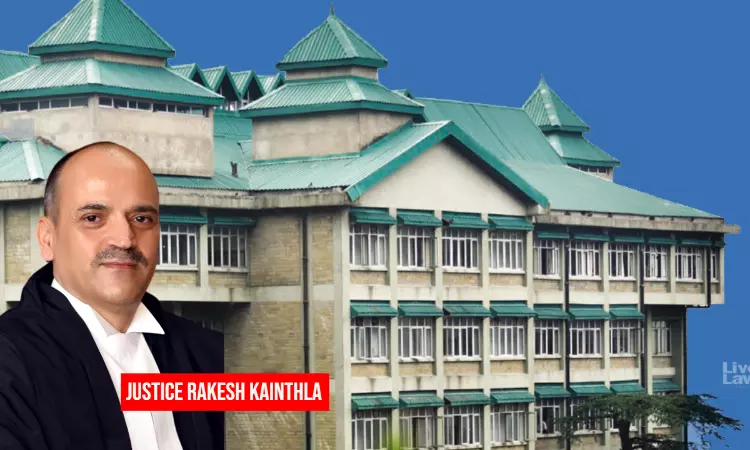- Home
- /
- High Courts
- /
- Himachal Pradesh High Court
- /
- Witness Statements Made From...
Witness Statements Made From Documents Supplied By Police Can't Be Relied Upon For Conviction: Himachal Pradesh High Court
Mehak Aggarwal
14 July 2025 3:30 PM IST
The Himachal Pradesh High Court has held that a witness's statement made only after seeing documents shown by the police can't be relied upon to uphold a conviction.Justice Rakesh Kainthla: “The statement of this witness shows that he did not remember the details of the documents, and he made the statement after seeing the documents brought by the police, which means that he was making...
The Himachal Pradesh High Court has held that a witness's statement made only after seeing documents shown by the police can't be relied upon to uphold a conviction.
Justice Rakesh Kainthla: “The statement of this witness shows that he did not remember the details of the documents, and he made the statement after seeing the documents brought by the police, which means that he was making the statement based on the documents shown to him by the police and not the personal knowledge. Hence, his testimony cannot be relied upon to hold that the agriculturist certificates were annexed to the sale deed.”
Background Facts:
The petitioner, Tejinder Singh, filed a complaint against Govinder Singh, the respondent, alleging that he had purchased two parcels of agricultural land in District Shimla, through two sale deeds. As alleged by the complainant, forged agriculturist certificates were attached to these deeds.
During the investigation, it was found that the agriculturist certificates were fabricated, and the patwari of the area stated he had not issued the alleged certificates. The prosecution claimed that the forged certificates were produced with the sale deeds before the Sub-Registrars at the time of registration to circumvent Section 118 of the Act, which prohibits non-agriculturists from buying agricultural land in the State.
An FIR was registered, and the police alleged that the forged certificates were prepared with the help of a Patwari named Mast Ram (now deceased) and other co-accused.
During the trial, the respondent admitted purchase of the land, but denied producing any forged certificate. He contended that a false case was made against him by the petitioner, who is his brother, due to a family dispute.
After examining the evidence, the Trial Court acquitted the respondent. It held that the seller nowhere stated that he was deceived or dishonestly induced to sell the land; he confirmed that he sold the land for valid consideration and did not rely on any certificate.
The Court noted that the evidence linking the alleged forged certificates to the sale deeds was highly doubtful. The witnesses claimed that certificates were pasted on the file; however, the seizure memo mentioned the word 'Nathi', which means tagged. This made the whole case doubtful that agriculturist certificates were attached to the sale deeds. Thus, the Trial Court acquitted the accused.
Aggrieved, the State filed an Appeal before the Appellate Court. However, the judgment of the Trial Court was upheld, holding that the prosecution had failed to prove that the forged certificates were annexed to the sale deeds and used to complete the transactions. Thereafter, the State filed a revision petition before the High Court.
Findings:
The High Court noted that the petitioner has prayed in the revision that the accused be convicted. Section 401(3) of the Criminal Procedure Code states that the High Court is not authorised to convert the findings of acquittal into a conviction. In Mahabir v. State of Haryana, 2025, the Supreme Court held that “it is impermissible for the High Court to convert the acquittal into a conviction.”
The High Court rejected the petitioner's argument that the Trial Court misunderstood the case by framing the charge as cheating the seller instead of the State. It held that if the petitioner wanted to change the charge, he should have applied for modification at trial. The accused could not be convicted of cheating the State when the charge framed was only about cheating the seller. Further, even if the charge had been about cheating the State, it was not proved by the State that forged certificates were produced.
Most importantly, the court noted that the key witnesses, including Sub-Registrars, admitted in cross-examination that they did not remember the details, and they gave statements after seeing documents shown by the police during the investigation.
The Court concluded that its role was not to interpret whether the respondent was truly an agriculturist or whether sale deeds were valid, but only to see if the prosecution had proved beyond a reasonable doubt that forged certificates were actually produced. The evidence on record does not show that the certificates were produced.
Thus, the High Court upheld the decision of the Trial Court and dismissed the criminal revision.
Case Name: Tejinder Singh V/s Govinder Singh and another
Case No.: Cr. Revision No. 293 of 2022
Date of Decision: 08.07.2025
For the Petitioner: Mr. R.L. Sood, Senior Advocate, with Mr. Y.P. Sood, Advocate. For the Respondents: Mr. C.D. Negi, Advocate
For Respondent No.1: Mr. Ajay Kochhar, Senior Advocate, with Mr. Varun Chauhan, Advocate.
For Respondent No.2: Mr. Rajiv Sirkeck, Advocate.
For Respondent No.3: Mr. Ajit Sharma, Deputy Advocate General



